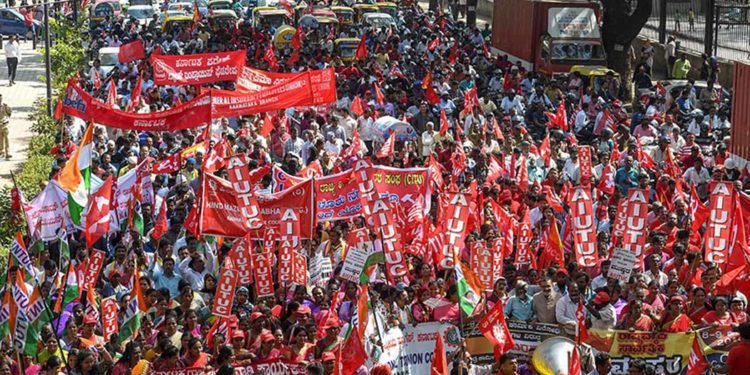NE NEWS SERVICE
NEW DELHI/CHENNAI, JAN 7
Central trade unions, except the Rashtriya Swayamsevak Sangh (RSS)-affiliated Bharatiya Mazdoor Sangh (BMS), have called for a nationwide strike on Wednesday, saying they are dissatisfied with the government’s “policy and action” towards workers.
This is the fourth nationwide strike called by 10 central trade unions since the Narendra Modi-led National Democratic Alliance (NDA) government came to power in 2014. Nearly 25 crore people are expected to take part in this all-India strike to protest against the government’s “anti-people” policies.
The unions have been calling for action on a list of demands, which they say have been ignored by the government.
The strike will be carried out by various industrial trade unions, women’s and farmers’ collectives. This will be supported by Left parties and central trade unions. Those participating in the strike include All India United Trade Union Centre (AIUTUC), Centre of Indian Trade Unions (CITU), All India Trade Union Congress (AITUC), Hind Mazdoor Sabha (HMS), All India Railwaymen’s Federation (AIRF) and Self-Employed Women’s Association (SEWA).
The All India Central Council of Trade Unions (AICCTU), Labour Progressive Federation (LPF), United Trade Union Congress (UTUC), Indian National Trade Union Congress (INTUC) and Trade Union Coordination Centre (TUCC) will also take part.
Trade unions INTUC, AITUC, HMS, CITU, AIUTUC, TUCC, SEWA, AICCTU, LPF, UTUC along with various sectoral independent federations and associations had adopted a declaration in September last to go on a nationwide strike on January 8, 2020.
“We expect participation of not less than 25 crore of working people in the forthcoming National General Strike on January 8, 2020, to be followed by many more actions seeking reversal of the anti-worker, anti-people, anti-national policies of the Government.
“The Ministry of Labour has failed to assure on any demands of workers which called a meeting on January 2, 2020. The attitude of the government is that of contempt towards labour as we construe from its policies and actions,” the 10 central trade unions (CTUs) said in a joint statement.
About 60 organisations of students and elected office-bearers of some universities will also join the protest, as will over 175 farmers and agricultural workers unions.
The unions have a 13-point charter of demands, which includes urgent measures to contain price-rise by “universalisation of public distribution system” and “containing unemployment through concrete measures for employment generation”.
The retail inflation, measured in terms of the Consumer Price Index (CPI), rose to a three-year high of 5.54% in November 2019, due to higher food prices.
One of the key demands has been to increase the minimum wage of workers. While it is a long-standing demand – unions have asked for monthly minimum wage to be set at Rs 15,000 for workers in the past – they now demand the government to hike it to Rs 21,000.
Additionally, the unions have demanded ‘worker’ status to all scheme workers, such as the Accredited Social Health Activists (ASHA) and those who work in providing mid-day meals in schools. Since these workers are not officially categorised as ‘workers’, they are not protected by most labour laws in the country.
The unions have asked for a minimum monthly pension of Rs 6,000, up from Rs 1,000. It had earlier demanded a minimum monthly pension of Rs 3,000. A six-time hike in the minimum pension to workers will require a huge budgetary support from the Union government – a key reason why it has not accepted any demand to hike the minimum pension as yet.
Other demands of the unions include a halt in the merger process of 12 public sector banks, no disinvestment and strategic sales of the central public sector units and bar on employing contract workers for ‘perennial nature of work’.
(With inputs from R Arivanantham in Chennai)









